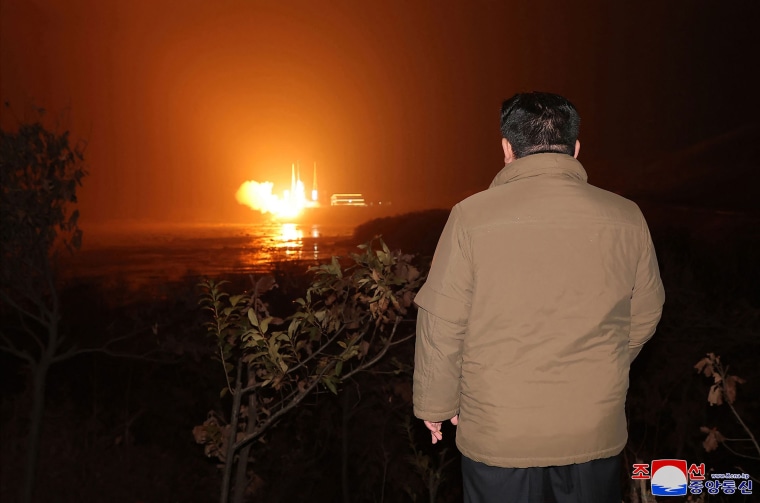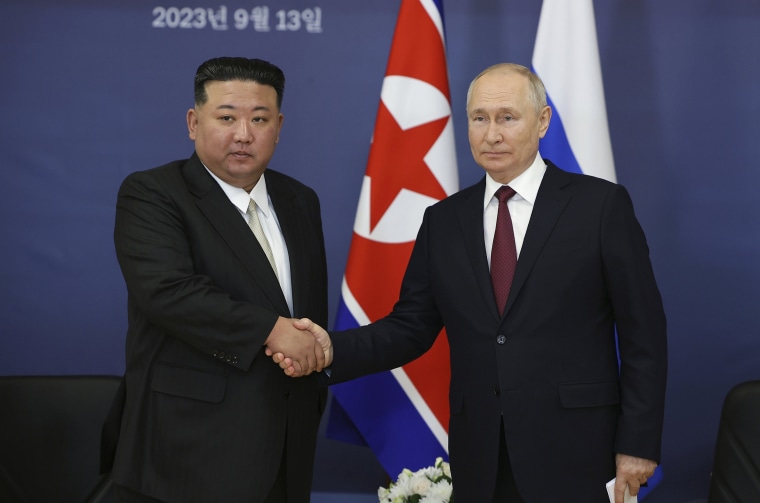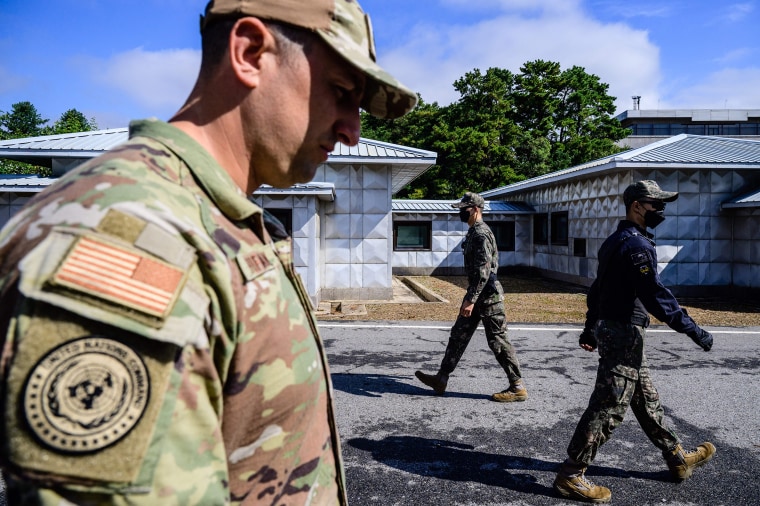SEOUL, South Korea — Is Kim Jong Un about to take North Korea to war?
For decades, the reclusive state has said its goal is to peacefully reunify with its “fellow countrymen” in South Korea. Now Kim has formally cast that goal aside, framing his neighbors as the enemy while intensifying his nuclear threats and tests — and raising alarm about whether, with the world focused on wars in Ukraine and the Middle East, he may be poised to start yet another conflict.
While threats and angry rhetoric are nothing new from North Korea, which was led by Kim’s grandfather and father before him, two renowned American analysts say Kim’s latest moves go beyond the “typical bluster” and suggest he could be preparing for an attack on South Korea, a U.S. treaty ally.
“We believe that, like his grandfather in 1950, Kim Jong Un has made a strategic decision to go to war,” former State Department official Robert L. Carlin and nuclear scientist Siegfried Hecker wrote this month in a widely talked-about essay on the U.S.-based website 38 North.
That analysis and Kim’s continued actions have set off an intense debate about just how worried the world should be.
‘A grievous failure of imagination’
In a historic step, Kim said last week that communist North Korea would no longer pursue reconciliation with the democratic South and that the North’s constitution would be changed to remove the idea of shared statehood between the two countries, which have remained technically at war since the Korean War ended in an armistice in 1953.
Speaking at a Jan. 15 meeting of his rubber-stamp parliament, Kim said that South Korea was the North’s “principal enemy” and that while nuclear-armed North Korea does not want war, “we have no intention of avoiding it.”
He also said he would abolish all government agencies responsible for promoting cooperation and reunification with the South and demolish the Reunification Arch built outside Pyongyang in 2001 to symbolize the goal of a unified Korean Peninsula.
The situation on the Korean Peninsula has been escalating since the start of the year.
State media on Jan. 1 reported Kim’s vow to “annihilate” South Korea if provoked. Days later, North Korea fired artillery shells near the disputed sea boundary off South Korea’s western coast, leading the South to hold its own live-fire drills.
Last week, North Korea said it had flight-tested a solid-fuel intermediate-range missile tipped with a hypersonic warhead, in its first ballistic test of the year. It also conducted another test of its nuclear-capable underwater attack drones, in protest against joint military drills by the U.S., South Korea and Japan. Such tests are a violation of United Nations Security Council resolutions.
Tensions had already ratcheted up throughout 2023, when North Korea launched its first spy satellite and its first solid-fuel intercontinental ballistic missile.
In response to the Nov. 21 spy satellite launch, South Korea suspended part of a 2018 military accord aimed at easing tensions between the two countries, resuming aerial surveillance near the border. North Korea then suspended the agreement altogether, restoring border guard posts and other military measures.

North Korea has also maintained close ties with China and strengthened its relationship with Russia, where Kim had a summit with President Vladimir Putin last year in his first foreign trip since before the Covid-19 pandemic. Last week, during a visit to Moscow by North Korea’s foreign minister, Russia said that North Korea was a “very important partner” and that the two countries were developing relations in all areas, including “sensitive” ones.
The U.S. and its allies have accused North Korea of supplying Russia with missiles and artillery for its war in Ukraine, which both countries deny.
Carlin and Hecker argue that North Korea gave up on diplomacy with the U.S. in 2019, when Kim and then-President Donald Trump held a failed summit in Vietnam. Since then, talks on North Korea’s nuclear and missile programs have stalled and North Korea has carried out a record series of weapons tests, developing more advanced, harder-to-detect missiles that may be able to reach the U.S. territory of Guam, as well as South Korea and Japan, both of which host thousands of American troops.
Washington says it is willing to negotiate with North Korea anywhere, at any time and without preconditions. But it also warns that any North Korean attack on the U.S. or its allies would be met with an “overwhelming” response and spell the end of Kim’s regime.
Assuming that threat will stop Kim from acting, Carlin and Hecker say, is a “fundamental misreading of Kim’s view of history and a grievous failure of imagination” that could lead to “disaster.”
Obstacles to war
North Korea experts generally agree that the situation on the Korean Peninsula is increasingly dangerous and that Pyongyang has changed its approach in recent years, leaning more on support from China and Russia as they challenge the U.S. on the world stage.

“There is a greater willingness to come into confrontation with South Korea because there is a feeling it is protected,” said Scott Snyder, a senior fellow for Korea studies and the director of the program on U.S.-Korea policy at the Council on Foreign Relations.
At the same time, South Korea’s conservative president, Yoon Suk Yeol, who was elected in 2022, has taken a harder line on North Korea than his predecessor.
“The two leaders are shutting down dialogue and more ready to show their military might,” said Yang Moo-jin, the president of the University of North Korean Studies in Seoul.
But most experts disagree with Carlin and Hecker that North Korea is on the verge of launching a war, saying its provocations are still mostly aimed at getting other countries to negotiate and that Kim may be timing them to coincide with this year’s U.S. and South Korean elections.
They say Kim may also be trying to shore up his regime in the face of instability at home, where the economy is struggling and there are reports of starvation as he spends freely on weapons programs.
Kim “will continue to throw word-bombs to sustain a high level of tension,” said former South Korean Defense Minister Shin Beom-chul. “But I believe Kim Jong Un cannot put his words into action, because his leadership will be critically hurt once he launches a serious military provocation and be quelled by the South Korea-U.S. alliance.”

There is always the risk of inadvertent conflict or a more limited attack, experts say, pointing to episodes such as the North Korean shelling this month.
“Things can quickly get out of control,” said Lami Kim, a professor at the Daniel K. Inouye Asia-Pacific Center for Security Studies in Honolulu. “Shellings or small-scale provocations can be very dangerous.”
But when it comes to premeditated war, a number of factors stand in North Korea’s way. Its conventional weapons are no match for South Korea’s, and the North lacks the food and oil reserves it would need to wage such a conflict.
Most important, North Korea lacks support from China and Russia, who prefer to maintain the status quo, Yang said.
The U.S. should take advantage of China’s influence over North Korea, he said, “because the U.S.-South Korea extended deterrence alone cannot control and stop North Korea’s aggressions.”
In South Korea, Kim’s rhetoric has not impressed people such as Margie Kim, who said it would be “suicidal” for him to attack the South.
“Kim Jong Un cannot be serious with his bluffing about going to war against South Korea,” said Kim, a resident of Seoul. “I heard it over and over, and so I cannot take his threats seriously.”
Stella Kim reported from Seoul and Mithil Aggarwal from Hong Kong.











